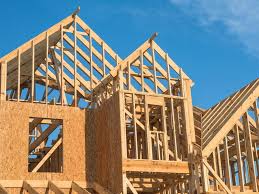There’s Never Been a Worse Time to Buy Instead of Rent

Getting on the property ladder has rarely been tougher for first-time buyers. But a tight housing market isn’t turning out to be a bonanza for landlords either.
The cost of buying a home versus renting one is at its most extreme since at least 1996. The average monthly new mortgage payment is 52% higher than the average apartment rent, according to CBRE analysis. The last time the measure looked out of whack was before the 2008 housing crash. Even then, the premium peaked at 33% in the second quarter of 2006.
In theory, buying and renting costs should be roughly matched, according to Matt Vance, head of multifamily research at CBRE. Although owners benefit when house prices go up, they also put more cash into their homes than tenants for things such as repairs and refurbishments.
The Invisible Role Taxes Play in America’s Housing ShortagePlay video: The Invisible Role Taxes Play in America’s Housing Shortage. From New York to Austin, America’s biggest cities are littered with vacant plots of land. WSJ explains the unseen role property taxes play in the country’s housing shortage. Photo Illustration: Amber Bragdon
From 1996 to mid-2003, the average cost to buy or rent did indeed work out more or less equal. After the global financial crisis, though, rock-bottom interest rates and plenty of housing supply meant it was 12% cheaper on average to buy a home than to rent one during the 2010s. The current hefty ownership premium reflects the surging cost of debt, as rates on a 30-year mortgage reach 8%, as well as high house prices since pandemic lockdowns raised the value of domestic space.
A person taking out a 30-year mortgage today on a $430,000 home with a 10% down payment would fork out around $3,200 in monthly repayments, 60% more than if they had bought the same house three years ago. Rents have risen by a less-blistering 22% over the same period, though this was still moderately ahead of wider U.S. inflation.
Rising house prices make it hard for renters to scrape together a 10% down payment, let alone afford spiraling mortgage costs. “There is a lot of shadow demand for homes, with a bunch of first-time buyers waiting on the sidelines for the payment-to-paycheck calculation to work for them,” says Odeta Kushi, deputy chief economist of First American Financial Corporation.
The average monthly new mortgage payment is 52% higher than the average apartment rent.
A collapse in prices would restore the market to balance, but seems unlikely barring a major recession. Those who bought their properties when rates were low have locked in cheap financing: Around 80% of outstanding U.S. mortgages have an interest rate below 5%. This gives homeowners an incentive to stay put, squeezing the supply of houses for sale.
On paper, these owners might appear to benefit from the current situation, but they, too, face costs. They can’t easily move, and downsizing to take advantage of record house prices might not add up, given higher mortgage rates.
With homeownership out of reach for many tenants, landlords would normally be able to push rents higher. But the supply of homes to rent isn’t as tight, with a glut of newly built apartments depressing rent growth. Demand from tenants is also weaker than it was during the pandemic, as most people who were planning to move have already done so over the last two years.
Fannie Mae thinks vacancy rates in U.S. multifamily buildings will reach 6.25% in 2024, above the 15-year average of 5.8%.
This will hurt institutional investors, who have poured billions of dollars into U.S. rental property in recent years. Apartment stocks are also underperforming. Since the buy-to-rent premium returned in early 2021, shares in AvalonBay Communities and Equity Residential have fallen 6% and 18% respectively, while the S&P 500 index has gained 8%.
In a dysfunctional U.S. housing market, even one that should be tailor-made for landlords, perhaps only lifelong renters are getting what they want.






